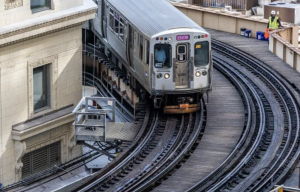Illinois budget relies on federal aid
Gov. JB Pritzker delivered a combination State of the State and budget address last Wednesday in a pre-recorded speech filmed at the Illinois State Fairgrounds in Springfield.
The former aspect of his virtual speech mainly discussed the pandemic, while budget elements dealt with Pritzker’s proposed spending and projected revenues for the next fiscal year that begins July 1.
Pritzker’s proposed budget keeps spending in the state relatively flat compared to last year and relies on federal money and corporate tax changes to achieve balance.
The budget calls for $41.6 billion in expenditures and predicts $41.7 billion in revenue, down about $400 million in each category compared to Pritzker’s proposal for this year’s budget and $1.2 billion compared to the spending the General Assembly approved.
“I had bolder plans for our state budget than what I am going to present to you today. It would be a lie to suggest otherwise,” Pritzker said. “But as all our families have had to make hard choices over the last year, so too does state government.”
In terms of expenditures, 21.9 percent of the budget goes to pensions, 20.8 to education, 17.7 percent to health care and 17.3 percent to human services, making those the largest spending categories.
Pritzker’s proposal maintains spending on both kindergarten-12th grade and higher education.
The few increases it has are mainly for departments that have seen their workload increase because of the pandemic like the Department of Children and Family Series, which would get a 7.9 percent increase.
Pritzker also called on the Legislature to OK an additional $73 million for the Illinois Department of Employment Security, with that money coming from federal funding.
Likewise, he proposed giving the Illinois Department of Public Health $1.7 billion, with part of that earmarked for disease tracking and vaccination programs.
“(This budget) reflects $400 million in additional cuts to appropriations, a hiring freeze, flat operational spending, full required pension payments and the closure of unaffordable corporate loopholes,” Pritzker, a Democrat, said. “All in all, it reduces spending to meet projected revenues.”
Only $148 million of the IDPH money would come from the state, with the rest coming from federal revenue streams that are a key tool Pritzker used to balance his budget.
One of the main sources is the Municipal Liquidity Facility program, which exists to help local and state governments manage cash flow problems.
Illinois borrowed $1.2 billion from that fund last year, which must be repaid this year, and Pritzker proposed borrowing an additional $2 billion that must be paid back over three years.
Similarly, Pritzker called on the General Assembly to decouple state tax code changes allowed in the Coronavirus Aid, Relief and Economic Security Act, thereby keeping revenues flat and allowing cuts passed last year by the federal government to not automatically affect Illinois.
Those moves are in response to a projected 4.1 percent decrease in revenue.
Pritzker said they were also in an effort to avoid increasing the income tax for everyone, a move he threatened after voters rejected the graduated income tax amendment in November.
Pritzker applied that same rationale to his plan to up revenue by $932 million through what he called closing “loopholes” in the state’s corporate tax structures.
Approximately $314 million would come from capping tax deductions businesses can claim due to net operating losses, while around $30 million would flow to the state by reinstating the corporate franchise tax the Legislature recently repealed.
Those maneuvers require General Assembly approval.
Republicans and their allies did not see measures like that as closing loopholes, but rather a tax increase on businesses.
“Gov. Pritzker once again showed the lack of leadership that inspired me to serve,” state Rep. David Friess (R-Red Bud) said. “With the failure of his graduated income tax measure on which he gambled this year’s budget, he is now proposing nearly $1 billion in new taxes on Illinois job creators. Where he previously could have worked with lawmakers to make smart, efficient cuts and reforms, Gov. Pritzker is choosing a go-it-alone process that will leave Illinois in a fiscal mess. This proposal hammers our small business industry in a year where they have already been shaken to the core.”
State Sen. Terri Bryant was perhaps even more critical of the proposal, arguing it was actually out of balance because it relied on funding that has not been OK’d by the Legislature.
“The governor of Illinois stood before the people of this state and demonstrated just how out-of-touch he is with the struggles and challenges Illinoisans have faced in their everyday lives over the past year,” Bryant said. “The budget put forth today is $1.7 billion out of balance, cuts funding to our Department of Corrections, redirects critical funding from Illinois’ infrastructure and eliminates hundreds of millions of dollars in business incentives. At a time when the hardworking families and the job creators of this state need responsible leadership the most, Gov. Pritzker is once again failing them.”
The fund redirection Bryant referred to references Pritzker’s plan to help balance the budget by shifting $565 million in revenue from dedicated funds to the state’s general fund.
That includes cutting money that goes to local governments by 10 percent, which Pritzker said would be offset by closing the loopholes, extending the payment deadline for interfund borrowing and moving $100 million in cigarette tax revenue earmarked for the infrastructure plan to the general fund for next year alone.
With Pritzker’s proposal as a starting point, the General Assembly will now begin the usually months-long process of creating the state’s final budget.
“Compromise, hard work and a willingness to make tough decisions are going to be required of all of us. I enter the process of negotiation with an open mind,” Pritzker said. “I have only one hard and fast rule – we aren’t going to treat people who have been decimated by this pandemic as roadkill. Those most in need in our most desperate times deserve our help, and we cannot fail them.”






